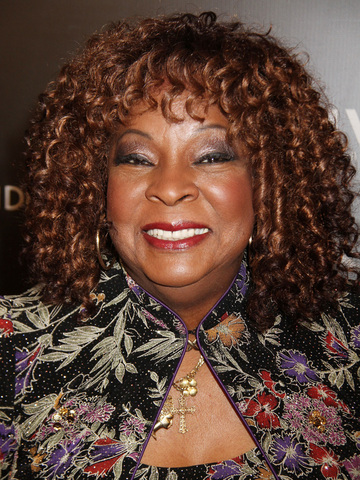Martha Reeves

Singer
Birth Date: July 18, 1941
Age: 83 years old
Birth Place: Eufaula, Alabama
Bands: Martha and the Vandellas
One of the leading ladies of R&B in the 1960s, Martha Reeves was the earthy, powerful leader of Martha Reeves and the Vandellas, a Motown female act that scored some of the label's biggest hits between 1964 and 1967, including "(Love is Like a) Heat Wave," "Dancing in the Street" and "Jimmy Mack." Reeves and the Vandellas' blend of church fire and street sass offered a grittier alternative to Motown's premier female vocal act, The Supremes, which endeared them to rock and pop listeners alike.
The Vandellas' fortunes ran out in the early 1970s, after which Reeves struggled to establish herself as a solo artist. She experienced a respectable comeback in the 1980s before moving into Detroit city politics for the better part of the 2000s. Though not quite as successful on the charts as Diana Ross and the Supremes, Martha Reeves and the Vandellas enjoyed lasting favor among music fans that took their music as a clarion call to get loose, get sweaty and enjoy life.
Born July 18, 1941 in Eufaula, AL, Martha Rose Reeves was the third of 11 children by the Reverend Elijah Reeves and his wife, Ruby Gilmore. She developed her parents' love for music, and as a student at Northeaster High School, trained with vocal coach Abraham Silver, who had also previously worked with members of the Supremes. Reeves formed her first vocal group, the Sabre-Ettes, in 1958, and briefly served as a member of The Fascinations several years before the release of their 1967 hit "Girls Are Out to Get You."
In 1960, Reeves joined the Del-Phis, a vocal trio that also included future Vandella, Gloria Williams. The group waxed a single for Chess in 1961, which failed to attract any attention, and later redubbed themselves the Vels. That same year, Reeves won a talent contest as a solo act, which earned her a regular stint as a nightclub performer under the name Martha LaVaille. Motown A&R executive Mickey Stevenson caught her act and invited her to audition for the label.
Reeves failed to land a contract with Motown, but found work as Stevenson's secretary alongside Diana Ross, who was serving as Berry Gordy's assistant while trying to launch her singing career with the Supremes.
A pair of lucky breaks elevated Reeves and the Vels from obscurity to national exposure. When backing singers failed to show up for a Marvin Gaye session, Reeves and her groupmates were enlisted as substitutes. The song, 1962's "Stubborn Kind of Fellow," became Gaye's first hit as a solo performer. That same year, Mary Wells feigned illness to miss a recording session, so Wells and the Vels were tapped to sing on the demo for "I'll Have to Let Him Go." Stevenson and Motown head Berry Gordy were so impressed by their vocals that they offered the Vels a contract. Gloria Williams dropped out, and the remaining trio - Reeves, Rosalind Ashford and Annette Beard - became the Vandellas. The group's new moniker was a combination of Reeves' home address on Van Dyke Street in Detroit and her favorite singer, Della Reese.
The group struck pay dirt almost immediately, earning a No. 6 hit on the R&B charts with "Come and Get These Memories" (1962). Its composers, the famed Holland-Dozier-Holland team, penned an even bigger follow-up with what became the Vandellas' signature song, the gospel-inspired "(Love is Like a) Heat Wave." It reached the top of the R&B charts and broke the Top 5 on the Billboard pop singles, as well as earning the group's sole Grammy nomination.
A string of ebullient, eminently danceable R&B hits followed in its wake, including the No. 2 pop hit "Dancing in the Street" (1964), "Nowhere to Run" (1965) and "Jimmy Mack" (1967). By the end of the 1960s, only the Supremes could challenge the Vandellas' status as Motown's pre-eminent female vocal group. Unfortunately, the Supremes soon gained the upper hand with the label. With the departure of many of Motown's key players in the late '60s, including the Vandellas' key songwriting team of Holland-Dozier-Holland, label chief Berry Gordy began to limit his focus to only a few groups. As a result, the Supremes derived the majority of Motown's promotion, while the Vandellas, along with established hitmakers like Marvin Gaye, Stevie Wonder and the Temptations, saw their careers slip into doldrums.
The Vandellas also experienced considerable turmoil within their own ranks. Annette Beard left the group in 1964 and was replaced by Betty Kelly of the Velvettes. However, she proved to be a volatile personality, often engaging in onstage fights with Reeves, so was quickly replaced by Reeves' sister, Lois.
Making matters more difficult was Reeves' growing addiction to prescription medication, as well as a nervous breakdown caused by LSD in 1968. By 1972, the Vandellas had run their course, and the group disbanded after a farewell concert that year at Detroit's Cobo Hall. Reeves announced plans for a solo career the following year, but did not want to stay with Motown after the label moved its operations to Los Angeles. She signed with MCA in 1974, where she released her self-titled debut to considerable critical acclaim that year. However, it generated no hits, and Reeves struggled to overcome her addictions until finally gaining sobriety in 1977.
For the next three years, Reeves recorded for a variety of labels, including Arista and Fantasy, but sold very few albums. By 1980, she was semi-retired, appearing occasionally on the oldies circuit. A 30-second performance of "Heat Wave" on the 1983 TV special "Motown 25: Yesterday, Today, Forever" (NBC) kicked off a period of revived interest in Reeves' career.
She appeared in a Broadway production of "Ain't Misbehavin'" and reunited with original members of the Vandellas for a 1989 tour. In 1995, she was inducted with the Vandellas into the Rock and Roll Hall of Fame, penned her best-selling autobiography, Dancing in the Street, and performed as part of the halftime show for Super Bowl XXXII in 1998. In 2004, Reeves released Home to You, her first album in over two decades.
The following year, she began a four-year tenure as a member of the Detroit City Council, then returned to touring for a well-received series of shows in the United Kingdom. Reeves appeared on the 2011 VH1 special "Divas Celebrate Soul," on which she performed "Nowhere to Run" with Kelly Clarkson and neo-soul singer Sharon Jones. By Paul Gaita
Credits

Secrets Of The River Clyde

Motown 60: A Grammy Celebration

Hitsville US Eh

Requiem for Detroit

Motown at the BBC

Celebrity MasterChef

Dancing With the StarsStream

Jimmy Kimmel Live!Stream

Definitely Dusty

Fairytales

Saturday Night LiveStream


